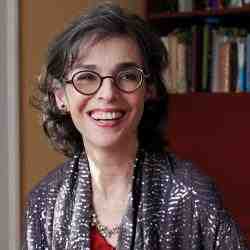Introduction
In the heart of India’s urban slums, where daily survival often overshadows the pursuit of education, one educator dared to reimagine what learning could be for its children. Geeta Dharmarajan, founder of Katha, believed that children shouldn’t be forced to learn how others want them to. Instead, they should be taught the way they want to learn—through stories. Katha’s approach ignores tedious textbooks and outdated teaching methods to inspire children to learn by telling them stories. This story-based alternate education model for urban poor makes learning fun and interesting, culturally relevant and practical by connecting concepts with stories and projects for their community, elevating children from wage earners to first-generation learners and leaders for community resurgence and driving transformation for the lives of their families and everyone around them.
The New Idea
Geeta Dharmarajan is transforming education for underserved children in India’s urban slums by making learning deeply engaging, culturally resonant, and immediately relevant to their lives. At the heart of her work is StoryPedagogy, a pioneering trademarked story-based teaching method that reimagines how children learn. Instead of relying on rote learning and rigid curricula, Geeta’s approach uses stories that reflect the lived realities of children in poverty—narratives that are familiar, empowering, and rooted in local culture.
Through this method, children organically absorb foundational skills in language, math, and science, while building the confidence to ask questions, think critically, and connect what they learn to real-world challenges. Over time, the pedagogy equips even first-generation learners to engage with advanced subjects such as marine biology and nanotechnology—subjects they might never encounter in traditional classrooms.
Katha, the organization Geeta founded in 1988, institutionalizes this approach through its Lab Schools, where StoryPedagogy is practiced and refined. Katha partners with municipal schools through programs like "I Love Reading," the School Quality Enhancement Program, and intensive teacher training initiatives to embed this approach into the formal education system and scale its impact. These programs ensure that joy, meaning, and cultural relevance are not just enhancements but essentials in education delivery.
Understanding the economic pressures faced by slum families, Geeta has expanded the model to include Katha’s School of Entrepreneurship and Information Technology and E-Commerce Schools, which provide livelihood-linked learning for older students. Meanwhile, Katha’s award-winning publishing house curates and distributes storybooks created in partnership with artists and storytellers from underrepresented communities—reviving India’s diverse oral traditions and making educational content locally grounded.
Geeta’s innovation lies in recognizing that literacy must go hand in hand with dignity, identity, and imagination. By putting story at the center of pedagogy, she is creating a new generation of reader-leaders who are not only literate but also empowered to be changemakers in their communities.
The Problem
The challenge of education in urban slums in India is deeply rooted in a mix of infrastructural inadequacies, socio-economic pressures, and systemic neglect. Many slum areas either lack formal schools altogether or have severely overcrowded and poorly maintained institutions. The quality of teaching is also compromised, with many schools relying on underqualified or frequently absent teachers. For families facing extreme poverty, sending children to work often takes precedence over education, leading to high dropout rates and the perpetuation of child labor.
These educational setbacks are exacerbated by social and systemic barriers. Children from slums often experience discrimination in formal educational settings due to their socio-economic status. Parental illiteracy and lack of awareness further diminish the perceived value of schooling. Migration patterns among slum dwellers lead to interrupted learning as children are frequently uprooted, causing inconsistent attendance or total withdrawal from school.
The broader context of rapid urbanization further complicates the issue. Since the 1960s, India’s urban population has expanded fivefold, with an increasing number of people living in slums. By the 2011 Census, over 65 million people were residing in urban slum households, with limited access to basic amenities, healthcare, and secure livelihoods. Among urban India’s 120 million children, about 7.6 million live in slums and face daily challenges that hinder their access to quality education. Despite India’s demographic dividend, these children remain one of the most underserved groups when it comes to educational opportunities.
Even though the urban child population has grown significantly, school infrastructure, teacher availability, and educational quality have not kept pace. Many urban schools are uninspiring and disconnected from the lived realities of slum children, failing to make learning meaningful or relevant. This disconnection contributes to low retention rates, as children do not see the value of education in transforming their lives. Alarmingly, 12 million children in India have never been to school, and a significant portion of those enrolled cannot read or write proficiently. Bridging this gap requires not just more schools, but more engaging, contextual, and child-centered learning environments—especially in the languages that children understand and use in their daily lives.
Katha’s practical yet imaginative storytelling makes children see connections everywhere. Geeta believes that in school, we are taught to unlearn the connections between things, and we are never taught how to join the dots. Katha, over the last three decades, has ignored the systematic approach to learning advocated by literacy programs and focused on how children like to learn, and that is through stories.
The Strategy
Geeta Dharmarajan, founder of the non-profit organization Katha, has reimagined education through a groundbreaking approach that places stories at the heart of learning. Her vision is rooted in the belief that stories are not just tools for literacy—they are powerful catalysts for curiosity, critical thinking, empathy, and cultural connection. Through Katha, she has empowered millions of children from the urban poor communities, helping them discover the joy of reading and the confidence to shape their futures.
In the early days of Katha (late 1980s), from her early experiments with Tamasha, a children’s magazine that became highly popular among slum kids to read, Tamasha quickly became an iconic magazine among slum children and the education departments of city governments picked it up from Geeta for imparting various types of educational content in simple format among children. The success of Tamasha helped strengthen Geeta’s belief that children loved stories and stories can play a pivotal role in imparting education and practical life skills to children, making it a creative way to get children to read and learn.
Geeta built on her experience from Tamasha to create an entire pedagogy and curriculum around stories. To demonstrate her approach in real time, she initially launched “The Katha Lab” School in Delhi, which serves as a live model and lab of this story-driven pedagogy. Here, traditional textbooks are replaced with narrative-rich learning, and each academic year revolves around a central theme that integrates science, math, language, and life skills. Students apply their learning beyond the classroom, solving real-world challenges in their communities—such as improving sanitation, promoting clean water access, and teaching financial literacy. Instead of rote learning from rigid textbooks, StoryPedagogy, which is an active story-based learning methodology, uses rich, culturally resonant storybooks as the core learning material. Stories are selected for their ability to reflect real-life experiences and stimulate imagination, empathy, and critical thinking in children. This holistic and experiential model of education transforms students into problem-solvers and changemakers empowering them to use their knowledge to solve day-to-day problems that affect their localities. Students go on to complete their schooling and graduate from the schools with open university certifications that put them on par with privileged students from mainstream educational backgrounds.
Geeta’s framework for education at Katha schools demonstrated outcomes in terms of retention and learning. Government school departments approached her to incorporate the essence of pedagogy in their existing frameworks as they faced the same issues of retention and lack of relevance that made children disinterested in education. Katha’s pedagogy and resources have been open source, and soon, more government schools and low-fee schools started picking up the model. The government soon came in and a formal method of integrating Katha’s methodology into municipal schools was set in place. The model became part of their daily curriculum through the ‘I Love Reading’ program. In order to increase the efficiency of the new system, Katha also provided these schools with School Quality Enhancement Programs and facilitated teachers’ training programs. ‘Padho Pyar Se’ helpline platform is made available for teachers to clear queries on concept delivery. This multi-pronged approach that extended outside Katha Lab Schools, into government schools multiplied the scale of her impact across multiple states in India. Katha helped integrate its methodology in more than 2,900 urban schools across 19 states, reaching some of India’s most marginalized communities. Through government collaboration close to 12.1 million students have benefited from this alternate education model over the past three decades. The pedagogy has now evolved to include technology into the trademarked StoryPedagogy. Concepts of IT, emerging technologies and robotics are introduced at Katha Lab Schools as well as schools that are associated with Katha. Children learn computer programming and coding, all weaved around stories that are introduced in the classroom at Katha and during I Love Reading programs at other schools.
To expand access, Katha introduced digital learning solutions, ensuring that children could continue learning beyond the physical classroom. Through the Katha Digital Lab and Bricks and Clicks initiative, she developed a hybrid education model that combined online courses, gamified reading activities, and storytelling applications. As part of the ‘Each Child Teach a Child’ movement, Katha made 475+ e-books, 90+ online courses, and 200+ gamified activities available, ensuring that children from underserved communities could engage with reading in a flexible, interactive, and self-paced manner. This approach not only made story-based education widely accessible but also played a critical role in maintaining learning continuity, particularly during the pandemic, when traditional schooling was disrupted.
Beyond childhood literacy, Katha’s vision encompasses lifelong learning. The School of Entrepreneurship is a natural extension of their educational work, linking learning with economic opportunities. Understanding that poverty often kept children out of school, Geeta addressed the economic barriers facing single mothers. She launched the Women Entrepreneurship Program, providing them with vocational skills that multiplied household incomes tenfold. Freed from financial dependence on their children’s wages, these mothers became staunch advocates of education, ensuring regular school attendance.
Meanwhile, the Katha Information Technology and E-Commerce School (KITES) provides training in digital literacy, coding, and job-readiness, helping young people convert education into employment. These institutions also showcase how-tos for youth and women to develop vocational, technological, and entrepreneurial skills, enhancing their capacity to generate income while staying connected to education. KITES, which started in 2001 in partnership with British Telecom, continues to extend support for youth outside the school-going age, engaging with youth from the community or those who graduated from the schools, seeking a continuum of support. Here, young women and girls learn how to use computers to enhance their livelihood opportunities. 77,754 women and 526,616 community members directly benefited from these programs.
Katha follows a frugal model and banks wholly on the creativity and problem-solving of the team that runs Katha. They run by the strong principle that no matter what, every action should be child-centric with no compromise on the quality delivered to children. Katha leverages the power of community to drive learning within the community they serve by enabling their own people, removing economic impediments, and driving transformational education at the system level.
Katha’s influence also extends into the publishing industry, where it challenges mainstream norms by redefining what children’s literature can and should be. Through the publication of over 535 multilingual children’s books, including translations from 21 Indian languages, Katha is democratizing storytelling and reshaping a sector long dominated by English-language and urban-centric narratives. By spotlighting local authors, illustrators, and stories rooted in lived experiences of India’s diverse and marginalized communities, Katha is creating space for cultural representation and linguistic inclusivity by taking indigenous knowledge forward and making their stories known to the world. This not only affirms children’s identities but also sets a precedent for the broader publishing ecosystem—encouraging other publishers to prioritize equity, diversity, and authentic storytelling. In doing so, Katha is not just producing books but actively transforming publishing into a vehicle for social justice and educational reform.
The Person
From a young age, Geeta Dharmarajan was immersed in the values of empathy and giving. Raised in a home where generosity was a way of life, she often accompanied her family on grocery trips that ended with a simple yet profound gesture—offering a handful of rice to those in need. This early ritual, inspired by her father, a doctor, and her grandmother, sowed the seeds of Geeta’s lifelong mission: to uplift communities through compassion and learning. Geeta’s leadership and creative expression emerged early. Educated at Holy Angels’ High School, she represented the school in dance and netball, was elected Head Girl, and led the South Indian contingent to the Bharat Girl Guides Jamboree in her final year. She went on to study English Literature at Stella Maris College, further grounding her love for language, literature, and storytelling.
Her professional journey began with Target, a children’s magazine, where she first shaped her editorial voice. She later worked with The Pennsylvania Gazette, the award-winning alumni magazine of the University of Pennsylvania, during her time in the United States. This rich editorial experience, spanning both Indian and international contexts, deepened her understanding of storytelling’s power to educate and connect. Returning to India in 1988, Geeta was shocked by the low literacy levels among children in Delhi’s slums, despite years of schooling. She also noted a severe lack of children’s literature written by Indian authors and rooted in local realities. In response, she created Tamasha, a story magazine that used narrative and play to educate children about critical issues.
Building on her Tamasha experience, Geeta founded the Katha Lab School in Delhi’s Govindpuri slum and introduced StoryPedagogy™, a revolutionary educational model that uses stories to teach academic concepts. Deeply influenced by the Natya Shastra and her training in Bharatanatyam, Geeta developed a holistic method blending traditional art forms, storytelling, and curriculum.
Her goal was clear: to build a nation of “reader-leaders”—children who not only enjoy reading but also apply their knowledge to solve real-world problems. Under Geeta’s leadership, Katha evolved into a national movement. Geeta’s work has earned some of the country’s highest honors. In 2012, she was awarded the Padma Shri for her contributions to literature and education. In 2019, she was named Business Standard’s Social Entrepreneur of the Year. Known for her pro-poor innovations, frugal design thinking, and deep community engagement, Geeta has silently built Katha into a transformative force in Indian education for the urban poor. Under her leadership, Katha has been recognised by various platforms such as the mBillionth Award, the Millennium Alliance Award and more.
At the heart of it all is Geeta Dharmarajan—a visionary who believes every child deserves the right to read, to imagine, to lead—and that the right story can change a life forever.




